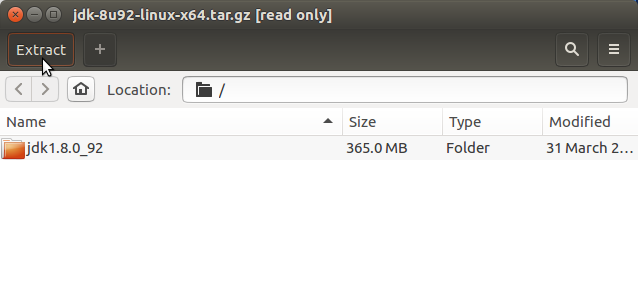Install Oracle JDK 8 on Ubuntu 14.04 Trusty i386/amd64
The Guide shows you in Easy-Steps How to Install Oracle-Sun Java SE JDK 8 i586/x8664 for Ubuntu 14.04 Trusty Tahr LTS Desktop/Server.
To SetUp Oracle JDK in you may need to make use of the update-alternatives Tool to Update your System Java.
Some Java 8 Features:
- LAMBDA Expressions Programming
- The Stream API
- The Nashorn Javascript Engine
To the How to Download and Install Oracle JDK 8 in Ubuntu 14.04 Trusty Bottom there is a Link for Quick Start with Java JDK 8 Development on Eclipse for Ubuntu.
Moreover, to Make the Process Easier to Visualize the Post Includes the Basic Screenshots of the Steps Involved.
The Contents and Details of How to Download and Install Oracle JDK 8 in Ubuntu 14.04 Trusty are Expressly Minimal to Give Focus Only to the Essentials Instructions and Commands and Make the Tut Easier to Understand ;)

-
Download Oracle Java SE JDK8 for Linux.
-
Double-Click on the tar.gz Archive and Extract into
/tmp

Or from Shell:tar xvzf ~/Downloads/jdk-8*.tar.gz -C /tmp/
-
Open a Terminal Window
(Press “Enter” to Execute Commands)
-
Relocate JDK 8
sudo su
If Got “User is Not in Sudoers file” then see: How to Enable sudo
Make a jvm Directory if Not already there withif [ ! -d "/usr/lib/jvm" ]; then mkdir /usr/lib/jvm; fi
Set the root superUser as owner
sudo chown -R root:root /tmp/jdk1.8*
Reiterate the Execution Permission over the Java binaries
chmod -R +x /tmp/jdk1.8*/bin
Finally, Shift the Java contents with
mv /tmp/jdk1.8* /usr/lib/jvm/
-
Installing Oracle Java JDK 8
You can directly Copy & Paste the Commands into Terminal..update-alternatives --install /usr/bin/java java /usr/lib/jvm/jdk1.8*/bin/java 1065
update-alternatives --install /usr/bin/javac javac /usr/lib/jvm/jdk1.8*/bin/javac 1065
update-alternatives --install /usr/bin/jar jar /usr/lib/jvm/jdk1.8*/bin/jar 1065
update-alternatives --install /usr/bin/javaws javaws /usr/lib/jvm/jdk1.8*/bin/javaws 1065
Checking or Setting the System Java Version in Use with
update-alternatives --config java
To Switch of Java Version Just Enter the Selection Number on First, Column. :)
Lastly to Exit from the Super-User session:
exit
-
Setting JAVA_HOME User Environment Variable (Optional).
su [myUserName]
Or simply:
exit
su [myUserName]
Or simply:
exit
And Edit the Bash environment Configuration file
nano $HOME/.bashrc
Append:
export JAVA_HOME=/usr/lib/jvm/jdk1.8[uX]
Replace the [uX] Looking for the Installed Java 8 Version with:
ls /usr/lib/jvm/
Ctr+x to Save & Exit from nano Editor :)
Load New Bash Config:bash
-
Test New Java JDK 8 Installation.
java -version
-
How to Install Eclipse Java on Ubuntu
-
How to Install Netbeans 8 IDE for Java on Ubuntu
Now Thanks to Oracle-Sun Corporation you are able to Successfully Start Up with Java 8 Development.
Welcome to Java 8 Challenge! ;)